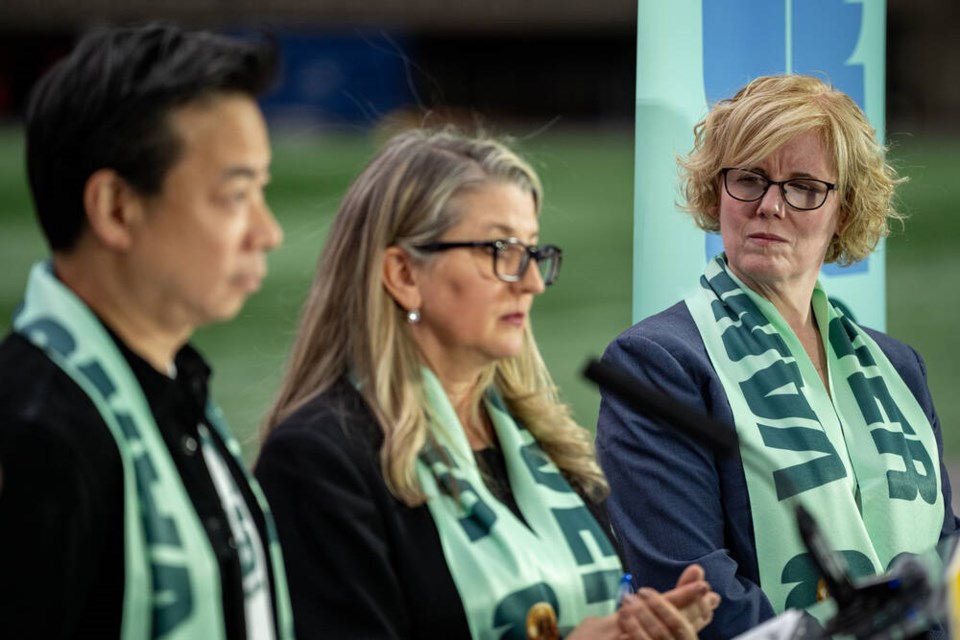After the paramedics have left and you’re resting comfortably, the key thing to do after reading the new updated 2026 World Cup cost estimates is to not compare them to the original estimates.
Original estimates on major public projects are like jottings of what a crayoned elementary-school mural might cost, before it turns into a giant diamond-encrusted tapestry of spun gold.
(Suggestion to governments: Do them on an Etch-A-Sketch from now on. Once they’ve served their purpose, you can just shake it and they’ll disappear.)
So pay no heed to the fact that original $240-$260 million estimate of costs for Vancouver to host some World Cup soccer games is now at least $483 million and could be $581 million.
Tourism Minister Lana Popham explained: “When we got the initial numbers it was before we had a full understanding of the requirements,” she said.
“We didn’t know how many games we were going to get. There were a lot of things that have changed since that original estimate.”
So, accept the bait and switch. Live in the now. The thing to focus on is the new cost-benefit analysis. It states that with more than 350,000 free-spending visitors expected and a $116-million federal contribution, the net hard cost to B.C. will be more like $100-$145 million.
The analysis presented Tuesday estimates $621 million worth of economic benefits, just during Vancouver’s share of preliminary games in the 39-day tournament. Most ($533 million) is under the heading of “labour income.”
Provincial officials say that describes all the additional wages paid pretty much anywhere in metro Vancouver due to the tournament.
“This could be FIFA’s spending in Vancouver, additional hiring in the hospitality and restaurant industry, and hiring for the provision of safety and security.”
Given that the last category is a big one, and would include thousands of staff from various parts of the public sector, it sounds like much of that total would be a cost as much as a benefit.
There are some fancy ball-handling skills on display elsewhere in the revenue accounting, as well.
The federal $116-million contribution (with more to come) is listed as revenue. But that seems to overlook that B.C. taxpayers are Canadian taxpayers. It’s as much a cost as it is revenue.
To make the picture brighter, they have also projected five years of economic benefits after the World Cup ends. The analysis predicts one million more out-of-province tourists will visit through 2030, based on Vancouver’s media exposure during the tournament.
They count that as a billion-dollar bump to the GDP and $136 million in additional tax revenue, based on Vancouver being one of 16 cities hosting seven of the 104 games.
We’ve already started ponying up the extra money that is needed. Hotel guests in Vancouver started paying an extra 2.5 per cent in February 2023 by way of the Major Events Tax. It’s expected to bring in $230 million.
One encouraging thing about the picture is that sizeable contingencies are built into the numbers. There’s room for a 20 per cent overrun in operating costs and 35 per cent in capital costs, without affecting the final tally.
While some of the benefits are just abstract projections, others are more concrete. BC Place is slated for a major upgrade worth $149-$196 million. That means more elevators, a new fan zone nearby, more hospitality suites and a new scoreboard.
Popham and Vancouver Mayor Ken Sim were positively gushing about the potential.
“The stories and the memories will be shared for years to come,” she said.
“We are literally hosting 30 to 40 Super Bowl equivalents,” he said.
Remembering B.C.’s previous global events — Expo 86 and the 2010 Winter Olympics — most people aren’t going to balk at the prospect of another epic party.
But there are countless details to work out. As it stands, even with the curious accounting moves, the World Cup will cost in the $100-million range, not counting the nebulous benefits expected five years after they end.
And for the next two years, it’s worth remembering most of the spending decisions are not in any government’s hands. FIFA calls the shots from here on in. Once Toronto and Vancouver signed on to host and were accepted, we’re all just along for the ride.



